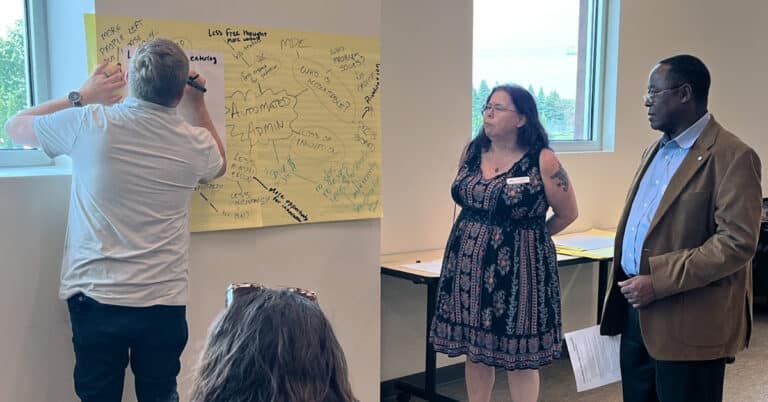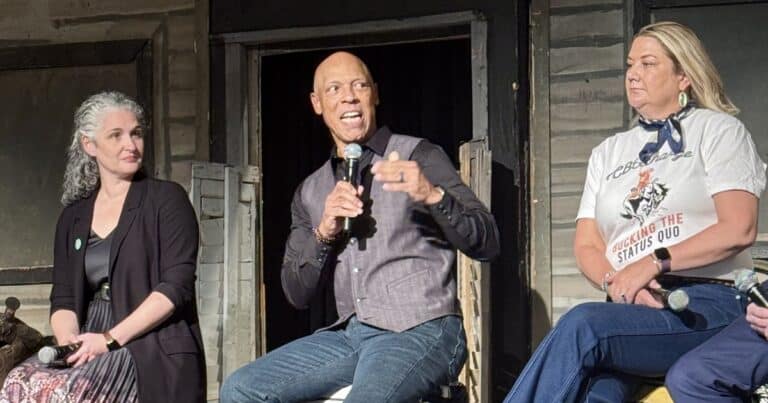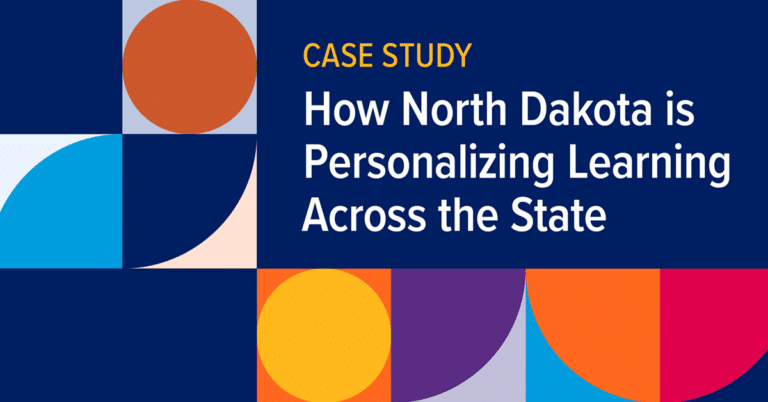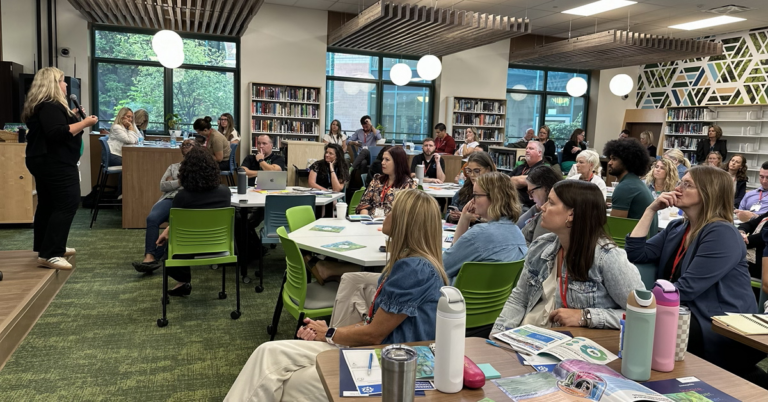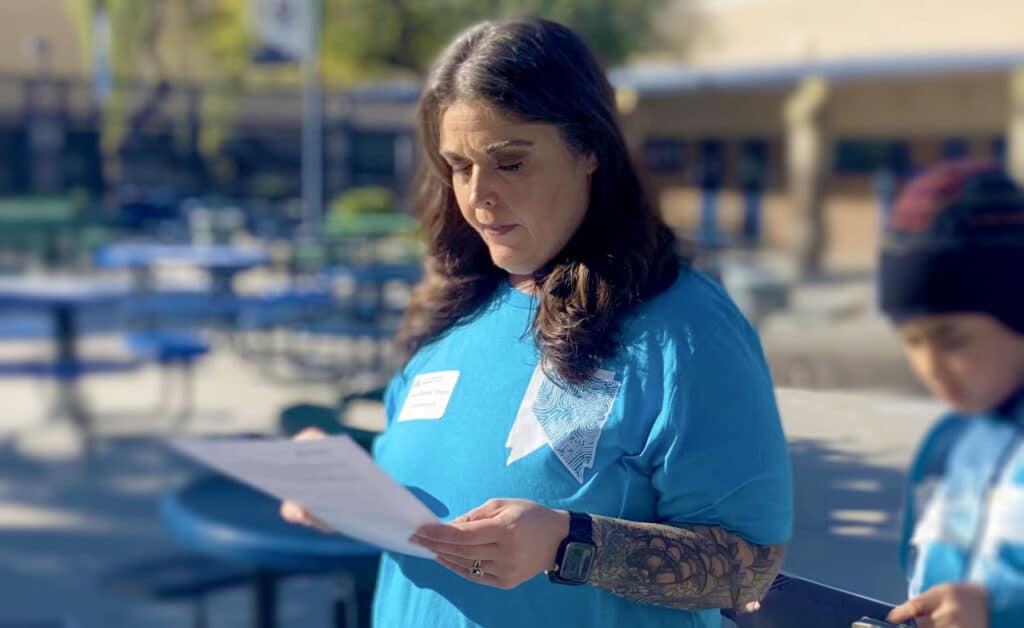
Laura Jeanne Penrod, a high school English teacher at Southwest Career and Technical Academy in Las Vegas, Nevada, was recently named the 2024 Nevada Teacher of the Year. She’s deeply invested in her students and the future of teaching and learning not just in Nevada, but across the country. Formerly a competency fellow with the Nevada Future of Learning Network, she’s now an ambassador for the work.
When you joined the Nevada Future of Learning Network, you brought students and their families with you to the first convening. Why did you think that was important?
As much as I know, there’s a lot I don’t know. I don’t know what it’s like to be a student anymore. I’m quite tired of having conversations for people who have a voice of their own. We can’t just ask educators and administrators and people who are making the decisions when students have voices of their own and are very capable of expressing what they think are great things, or what might not benefit them. When we’re not asking students what they need, we’re doing them a disservice.
And for their families to hear the direction the state of Nevada is moving in, and be able to consider if this is something they also want? It’s going to take a lot of people to shift the mindset around what education looks like. It’s difficult when you’re in a system that’s as old as education is; it has to be rolled out in such a way that anyone can understand. Families need to be very clear on what grading will look like and what options their students have.
What role does advocacy play in your work? In your students’ experiences?
Advocacy is my thing. I’ve been an advocate my whole life. I lived in an immigrant house and I was advocating for my mom’s needs, my needs and our family’s needs from a young age. What it’s taught me is that if I don’t use my voice, nobody’s going to ask me for it.
Advocacy is not always to benefit ourselves but to benefit the greater good of humanity. I teach my students to leave places better than they found them. What do you wish you would have had as a senior? What do you want for a younger sibling? What are the things you really enjoyed that you hope others also receive?
I worked with seniors on a project-based learning advocacy unit last year, and I still am in awe of what my students did. Project-based learning is design-focused; I’m giving you a problem to solve. I asked, how do we make education more progressive for every learner in Nevada? They had to figure out their solutions. One of their big-ticket items was financial literacy. It was something they directly felt was important and they got behind it alongside other bills, including having cultural and religious regalia at graduation. They got that signed into law.
At 17 years old, they were meeting with legislators, using their voices, setting up meetings, collaborating. I had no doubt that when they left my room, they knew how to contact someone in a position of power. They might not get the answer they wanted, but they had to work through that, too.
How does your role as Nevada Teacher of the Year align with your involvement in the Nevada Future of Learning Network?
Ambassadorship fits with my role as Nevada Teacher of the Year because it gives me a much broader reach. I’m in a fellowship with colleagues in other states who are already doing this work and I can learn from them, I can share what Nevada is doing. Are we on target? Are we looking at competencies in ways that are meaningful for students? In ways that work for colleges? How can we move education forward as a country?
Too frequently in this country we work in isolation and think, this is education’s problem. But how our students are educated impacts everybody. If learners don’t have basic skills, if they don’t know how to solve problems, think critically, communicate or advocate for themselves or others? We have to be invested in learners acquiring those skills. The community has to be invested in it.
I have to do a fair job of representing everyone in education – not just teachers but counselors, my colleagues, my students. I feel like I need to absorb their concerns and take that in with me so that we are moving education in Nevada in a positive direction.
Why is it important to make changes to education now?
With the rise of AI, we have to ask ourselves as educators: How do we teach students to be critical thinkers and writers and have their own voice that a computer can’t duplicate? How do we teach them how to have a positive interaction with an AI? Whether the machine is a factory line 100 years ago or an AI today, we have to teach them to use these tools as tools – not as a replacement. If AI can write a paper, then I’m not going to have you do a paper. I’m going to have you do a presentation or teach us something that utilizes your creativity, your humanity.
We are not creating factory workers. We have to have conversations about teaching children to be irreplaceable.
What do you believe the Nevada Future of Learning Network will impact education in Nevada?
I hope that the network can dispel some of the ideas that competency-based education doesn’t hold kids accountable. We have to be clear on what competency means, and what it looks like, in student- and family-friendly language. With a skill like being able to communicate, what does it mean to be competent as a kindergartener? As a first grader? In middle or high school? How do these skills build on each other? That’s what the competency fellows are working on.
Competency-based education doesn’t mean we’re not holding kids accountable. As we explore this more, we have to get comfortable with students exploring more. Hopefully there’s more leeway to have students reach competency. Not in the leeway in accountability, but leeway in flexibility in how they learn and how they express that learning. It’s not always tied to a test.
We have to start thinking about how we’re creating great people – not great test takers, not really compliant students. We’ve got to move away from things that don’t serve kids.
This was written by former Senior Manager of Communications Jillian Kuhlmann.

